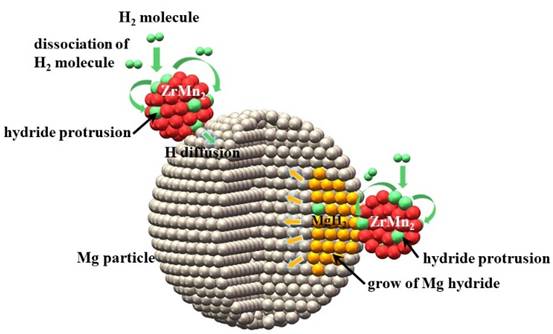近期,公司研究生蔡泽亮、教师张刘挺、肖蓓蓓、杜军等的研究成果“A striking catalytic effect of facile synthesized ZrMn2 nanoparticles on the de/rehydrogenation properties of MgH2”在《Journal of Materials Chemistry A》(IF=9.931)上发表。
论文简介如下:
Zr-based Laves phase alloys, especially the ZrMn2, has been widely studied because of its good hydrogen storage properties. In this work, ZrMn2 nanoparticles were successfully prepared by a facile wet-chemical method and then introduced to MgH2 via ball milling to fabricate the MgH2–ZrMn2 composites. Remarkable improvement on the de/rehydrogenation properties were achieved with the addition of ZrMn2 nanoparticles. The MgH2+10wt% nano-ZrMn2 composite started to release hydrogen at 181.9 °C, which was about 160 °C lower compared with that of additive-free MgH2. At 300 °C, the MgH2+10wt% nano-ZrMn2 composite could desorb 6.7 wt% hydrogen in 5 min. More importantly, the dehydrogenated MgH2+10wt% nano-ZrMn2 sample could absorb hydrogen even at room temperature under 3 MPa hydrogen pressure, and approximately 5.3 wt% hydrogen was took up within 10 min at 100 °C. Moreover, compared with additive-free MgH2, the dehydrogenation and rehydrogenation activation energy of the MgH2+10wt% nano-ZrMn2 composite were significantly reduced to 82.2±2.7 kJ•mol−1 and 22.1±2.7 kJ•mol−1, respectively. TEM analysis demonstrated the uniform distribution of ZrMn2 nanoparticles in the MgH2 matrix. Further density functional theory calculations reveal that the presence of ZrMn2 facilitated the breaking of the Mg–H bond, which well explained the reduced de/rehydrogenation temperatures of the ZrMn2 modified MgH2.

全文下载:https://pubs.rsc.org/en/content/articlepdf/2019/TA/C9TA00120D